RUSSIAN STRATEGY VERSUS TURKISH ARMS, US FANTASIES, GREEK AND CYPRIOT FRIGHTS – GORILLA RADIO DISCUSSES THE WAR OF THE MEDITERRANEAN MAPS
by John Helmer - Dances with Bears
December 13, 2019
@bears_with
In the great game of who will sell gas to Europe, and in the American game of stopping Russia from doing so, Turkey has now declared its stake in the outcome by erecting a paper barrier across the Mediterranean Sea from the Turkish coast to the Libyan coast, and preparing to move armed forces into position to enforce it. This is both a bluff and a dare.
Moscow - The paper was signed in Istanbul on November 27 between the Turkish Government and the Government of National Accord (GNA), one of the sides in the Libyan civil war. Read their memorandum of understanding and the new Turkish map of the Mediterranean here.
Turkish President Recep Tayyip Erdogan followed this week with two extras. On Monday he said: “Greek Cypriots, Egypt, Greece, and Israel cannot establish a natural gas transmission line without Turkey’s consent.” Then on Tuesday: “If Libya were to make a request, we would send a sufficient number of troops. After the signing of the security agreement, there is no hurdle.”
Never mind that at the moment the GNA is losing the Libyan war.
The Turkish bluff will not work against Russia, which is backing the GNA’s more powerful rival, the Libyan National Army (LNA). Nor is Turkey aiming at Russia; both have a common interest in preserving their new export pipeline for gas, TurkStream, to southern Europe through Turkey, and in beating the competition.
The Turkish dare is aimed at the US, Greece, Cyprus and Egypt, challenging them to try their own navies and air forces at pushing the Turks back inside their land border; drill for gas on the seabed Turkey is claiming; and run pipelines through the barrier with which the Turks aim to stop them. For the time being, Erdogan is calculating the Americans, Greeks, Cypriots and Egyptians won’t dare to land a punch. So far he’s right.
Beyond generalities, Russian strategy in the Mediterranean is not openly discussed in the Russian media nor by the state-financed think-tanks. In conditions of US war and sanctions, this is inevitable – Turkey is a Russian ally against the sanctions, so its involvement in combat against Russians in Syria and Libya, is an especially sensitive topic for the Kremlin.
The Arab and American press are less inhibited, reporting Russian military engagement in Libya, including technicians, combat special forces, weapons, intelligence and battlefield electronics. The Russian policymakers on Libya, who talk on the record, are Mikhail Bogdanov, deputy foreign minister for the Middle East and North Africa; and Lev Dengov, head of the Russian contact group for the intra-Libyan settlement. Vice Admiral Igor Kostyukov, head of the General Staff’s Main Intelligence Directorate (GRU) since last December, directs intelligence and tactics. Coordination of civilian and military operations has been tested for several years now by the General Staff, Foreign Ministry and Security Council on the Syrian and Ukraine fronts; Kostyukov headed military intelligence in Syria for some time; he has been sanctioned twice over by the US on allegations of cyber operations in US elections.
Left to right: Mikhail Bogdanov; Lev Dengov; Igor Kostyukov.
President Vladimir Putin has acknowledged that he has been discussing Libya with President Erdogan for several months now, starting in August. Erdogan proposes to challenge Russian support for the LNA and its commander Khalifa Haftar next month when he and Putin will inaugurate the TurkStream pipeline. “I hope the Russians would not let Haftar become another Syria,” Erdogan declared this week. Erdogan telephoned Putin to discuss Syria and Libya again yesterday.
“The presidents expressed concern over the armed clashes around Tripoli,” the Kremlin communiqué reports. “A prompt ceasefire and the resumption of intra-Libyan peace talks would contribute to the normalisation of the situation.”
Then Prime Minister Putin met Libyan leader Muammar al-Qaddafi in Libya in April 2008. Qaddafi then visited Moscow and met with President Dmitry Medvedev in November of the same year. Russian sentiment towards Qaddafi turned more positive after his assassination on October 20, 2011, than it was through much of the the fifty years of his rule, especially during the Yeltsin Administration. Kremlin officials never appreciated Qaddafi’s unpredictability and sense of humour. Greek Prime Minister Andreas Papandreou enjoyed both. The NATO military campaign against Libya and Qaddafi’s death also coincided with Russian disappointment in the Libyan readiness to invest in Oleg Deripaska’s aluminium schemes; for details, read this.
In October, in an interview with Arabic media, Putin was explicit in condemning US and NATO operations in Libya, including the murder of Qaddafi, as a “trick”: “As for Libya, the chaos wrought by the military operations still prevails,” Putin said. “But in this case, our Western partners played a trick on us, using the vernacular term (I do not know how this will be translated). Russia voted for the corresponding Security Council resolution. After all, what does this resolution say, if you read it carefully? The resolution prohibited Gaddafi to use aviation against the rebels. But there was nothing about allowing any air strikes on Libyan territory. But that was what actually happened.”
“So, basically, what happened there was done circumventing the UN Security Council. And we are all aware of what happened next. There is still chaos and confusion; a flow of migrants went through Libya to Europe.
“Gaddafi had always warned about that, he said that he stopped African migrants from going to Europe. As soon as this ‘wall’ was gone, they started pouring into Europe. And now they have what they were warned about. But that is probably not even the main issue. Most importantly, it is destabilising the entire Middle East region.”
On December 6 in Rome with his Italian counterpart, Foreign Minister Sergei Lavrov was asked how he views “the treaty between Turkey and Libya on the maritime border and logistics, including military supplies?” He made the distinction between Turkish bluff on paper and military escalation on the ground. But he didn’t mention Turkey. “The situation in Libya is very difficult because there are too many groups involved there, and too many questions are asked on who is the most legitimate. We have the UN Security Council’s decision, which, as I have said, should be honoured. In this respect, for example, the legitimately recognised parliament of Libya in Tobruk expressed disagreement with the signed document you mentioned. Libya’s neighbours also expressed concern. We cannot fail to consider this. Of course, any steps taken on the ground and on paper should factor in the extremely delicate nature of the situation and contribute in the best way possible to ensuring that everyone involved in the Libyan crisis act together, sit at one table. This includes the African Union as well which is undeservedly pushed aside when it comes to the Libyan settlement.”
A Greek press report by Theodore Karyotis this month published a series of Turkish maps, starting from the 1970s and illustrating the progressive expansion of Turkish claims to an exclusive economic zone (EEZ) westward and southward into territorial waters of the Greek islands of the Aegean and Mediterranean.
CLICK ON IMAGE TO ENLARGE
CLICK ON IMAGE TO ENLARGE
CLICK ON IMAGE TO ENLARGE
CLICK ON IMAGE TO ENLARGE
Source: http://johnhelmer.net/
Turkey’s claims are “comical”, Karyotis wrote, “because with the position it takes that islands do not have an EEZ/continental shelf, the Turks should let President Trump know that Turkey does not recognize the EEZ of Hawaii, the EEZ of the American islands in Alaska bordering on Russia, and the illegal demarcation of the US with Cuba and the Bahamas. Finally, let’s not forget that, for Tayyip Erdogan, islands such as Ireland, the United Kingdom, Sicily, Greenland, Australia, and so on, do not have an EEZ!”
Not so comical, according to a statement issued yesterday by the UN Secretary-General, Antonio Guterres. Through a spokesman he declared neutrality towards Ankara: “The [UN] secretariat shall not take a position or comment on issues relating to sovereignty, sovereign rights or the jurisdiction of the Member States for their maritime spaces”.
A report in Greek by Marios Evriviades, a former Cypriot diplomat and presidential advisor, now university professor, is critical of this passivity in the face of what he calls Turkey’s “cartographic propaganda”. Turkey has a relatively short coastline, Evriviades points out, ranking 20th in the international table. Thus, Turkey has a relatively smaller claim to an exclusive economic zone (EEZ) — significantly less than Greece whose coastline is the longest coastline in the Mediterranean, almost double Turkey’s — 13,726 kilometres compared to 7,200.
CLICK ON IMAGE TO ENLARGE
Source: https://www.worldatlas.com/
But that’s on paper, not on the ground, Evriviades emphasizes. He is sharply critical of the failure of a succession of Greek governments to contest the Turkish claims. “With a half-truth, the Turks aspire to half of Greece – the Greek islands. And half-truths are far worse than lies. They are the basic and crucial factor in propaganda… The Turks never refer to their ‘coastline’ in the Mediterranean. They always say they have the largest ‘continental coastline’ of the Mediterranean, submitting, accordingly, that they ‘are entitled’ to the ‘lion’s share’ of the EEZ of the Mediterranean, to the damage of neighbouring Greece and Cyprus. With this oriental ‘joke’ the Turks try to cancel half of Greece… Greek territorial sovereignty in the Greek islands, the Turks say, does not exist… They don’t have a continental shelf. They don’t have an EEZ. They have nothing. Rhodes, Karpathos, Kasos, Kastellorizo, and so on. And now [after the Turkish-Libyan map], we learn, not even Crete. For the Turks, the Greek islands are non-existent.”
Evriviades is critical of Greek failure to resist Turkey’s claims on paper and by military force. “Especially on the issue of sea borders and the EEZ, Athens has been chasing its tail for decades in the belief that Turkish aggression will magically evaporate.” Greek and Cypriot policy, according to Evriviades, should be to call the Turkish bluff. That this isn’t happening he blames on the role of the US, the Obama Administration as well as the Trump Administration, in support of the Turks for the US strategy of countering Russia.
Evriviades republishes a recent map from the State Department’s Bureau of Energy Resources, entitled “Selected Energy Infrastructure in the Eastern Mediterranean”. It has been declassified by a US newspaper’s Freedom of Information request.
CLICK ON IMAGE TO ENLARGE
Text source: https://amp.mcclatchydc.com/
Source of map: https://assets.documentcloud.org/
In Evriviades’s assessment, “all the energy pipelines lead to Turkey. Because the map of the EEZ of Cyprus exists, it appears on the American map even though the graphics of the pro-Turkish map overlap with Turkish claims. But just because there is no Greek challenger map, the whole area is presented as a Turkish claim. Today the Americans have added Turkish claims to that end… In Libya, the next official American charter will include theirs too.”
US officials are explicit that this map has been drafted to illustrate their strategy of attacking Russia’s energy exports. “Countering Russia’s creeping influence over energy resources in the region, the officials say, “could certainly be an implication”, with US encouragement of resolution of maritime demarcation disputes in favour of traditional US allies, the Israelis and the Turks. “The map outlines oil and gas finds off the coasts of Cyprus, Egypt, Israel and Lebanon over the course of the last decade, and draws between them potential pathways for export that could ultimately facilitate the sale of regional gas to the E.U. ‘It’s a glaringly obvious policy choice that supports U.S. and regional interests. There isn’t much downside. But it does require attention to detail, and over two years there’s been an attempt to reinvent the wheel that has wasted time,’ ”, the newspaper quoted Amos Hochstein, a State Department coordinator for international energy affairs in the Obama Administration.
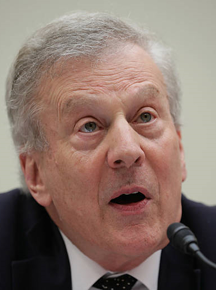
This strategy is wishful thinking, according to Simon Henderson (right), a former Financial Times reporter now with an Israeli think-tank in Washington.
“The idea that East Mediterranean energy could impact on the European energy balance in such a way as to dent Russian market share is a fantasy – Europe’s thirst for gas is so huge, and Russia’s ability to provide that gas is so great, that it’s a wild dream to even hope we can achieve it given the limited reserves discovered thus far.
“Hoping you can find gas is not the same as finding gas.”
Fantasy or not, Russian public policy is to maintain equidistance from all of the Libyan factions, except for the Islamists. Sarraj of the GNA, for example, was an official participant in the Russia-Africa summit meetings in Sochi in October. Putin told Sarraj at their meeting: “We wish you”, Putin told him, “a speedy restoration of peace, law and order, I am sure that the desire for an agreement between all the conflicting parties should lead to the restoration of Libyan statehood. We will all contribute to such a process.”
Left: Sarraj with Putin in Sochi, October 24.
Right: Sarraj with Erdogan in Istanbul, December 13.
At the same time, much bigger than the Russian stake in Libya is the Russian interest to defend itself from American schemes in the eastern Mediterranean. Erdogan is serving that purpose.
Listen to today’s Gorilla Radio discussion starting at Minute 33:00. 
Click: http://www.gorilla-radio.com/
Gorilla Radio is broadcast every Thursday on CFUV 101.9 FM from the University of Victoria, British Columbia, Canada. The radio station can be heard here. The Gorilla Radio transcripts are also published by the Pacific Free Press and on the blog. For Chris Cook’s broadcast archive, click to open.

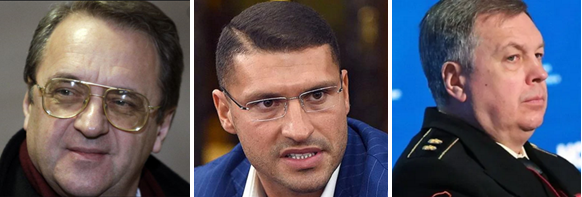
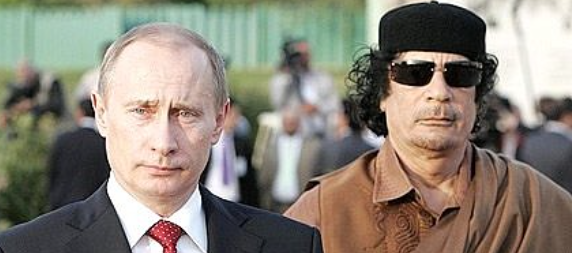
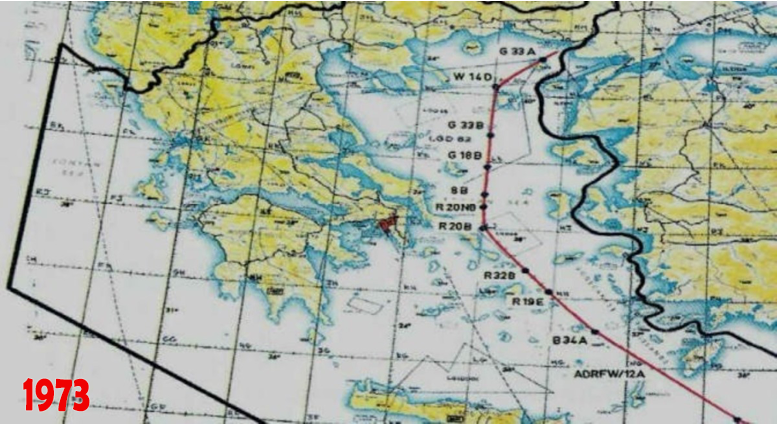

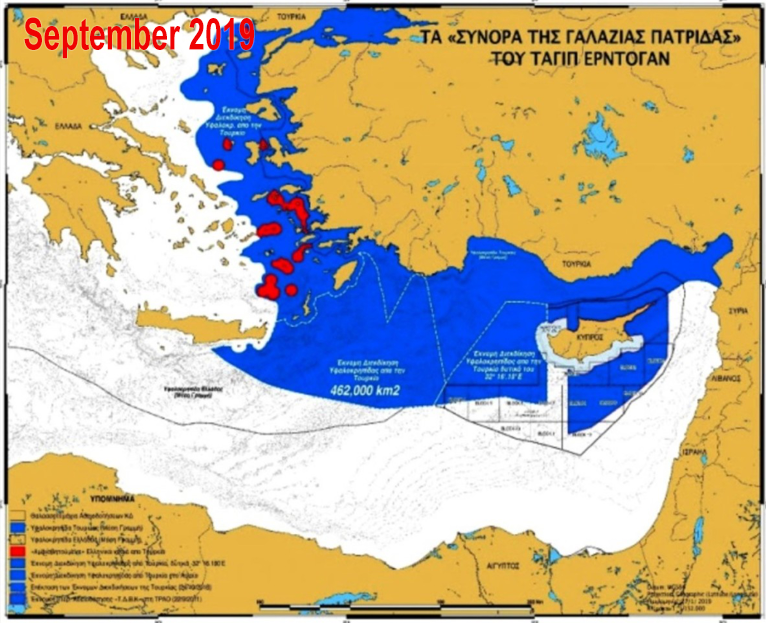
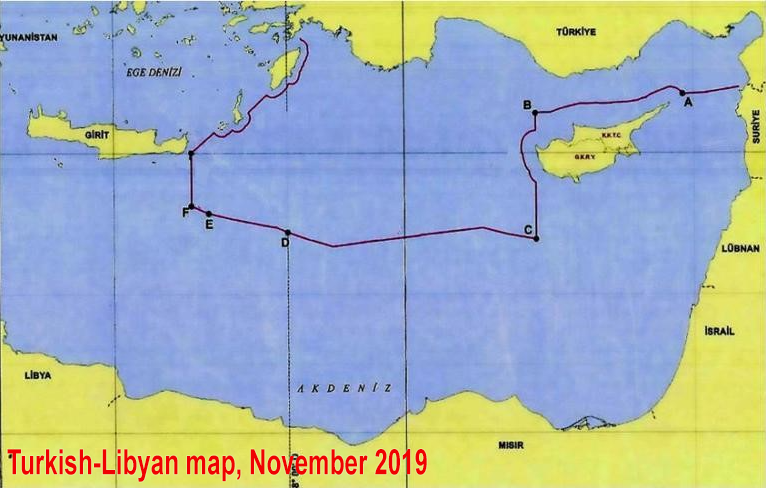
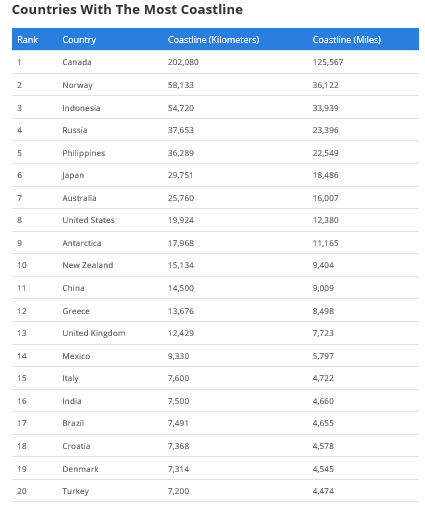
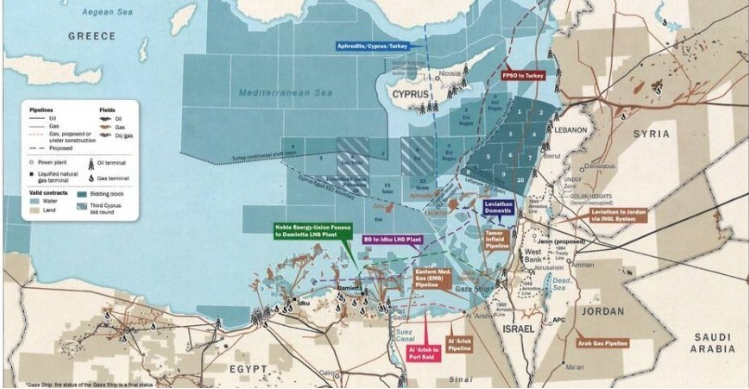
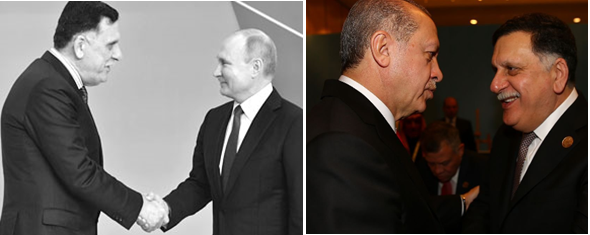
No comments:
Post a Comment